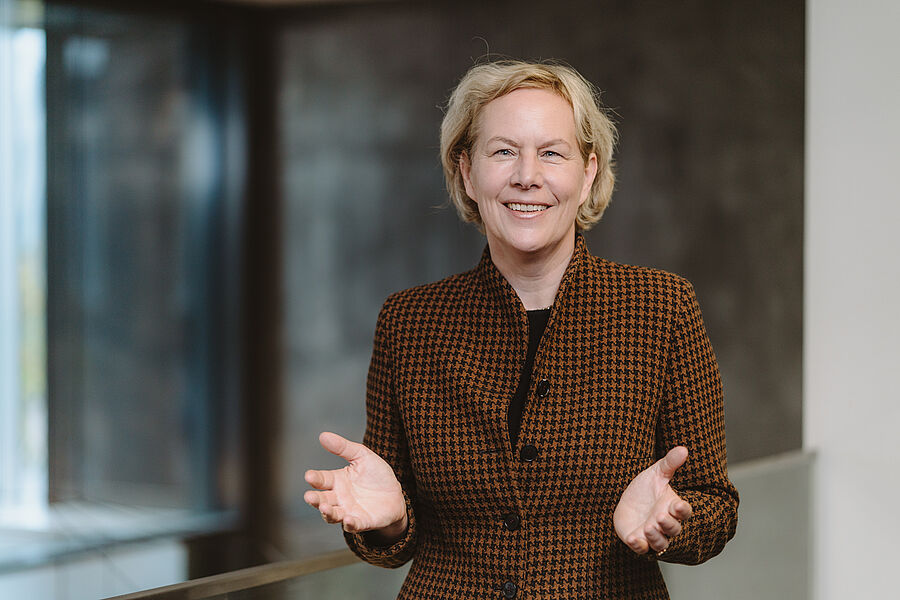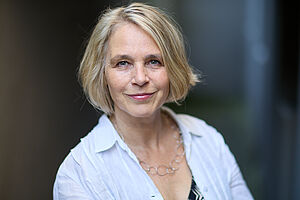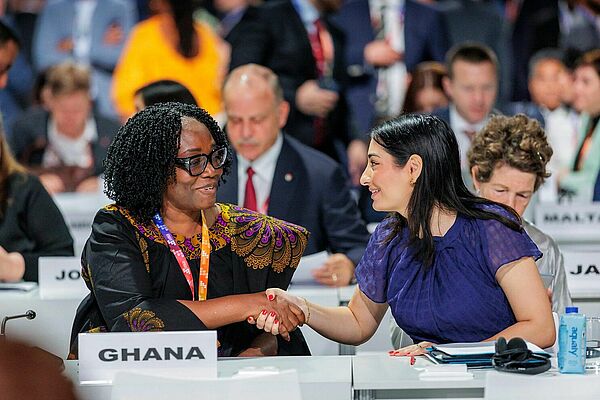‘Companies have legitimate interests’

Market failures and distortions legitimise the use of private sector engagement instruments. This statement is taken from the current report by the German Institute for Development Evaluation (DEval) on cooperation between the private sector and development policy actors. How can we bring companies and official development cooperation agencies together such that both sides benefit? In the interview, Amélie Gräfin zu Eulenburg, co-author of the report, explains which control levers those responsible can adjust to make future cooperation both more efficient and more effective.
Different perspectives – shared success?
AWE: Ms zu Eulenburg, you and your team analysed how efficiently the private sector and development policy actors implement joint projects. What did you find out?
Amélie Gräfin zu Eulenburg: The most important thing we learned was that PSE responds to existing structural and regulatory challenges. In the Global South, the signs of market failure, development gaps and generally difficult investment conditions are plain to see. Political support is therefore a precondition for companies even considering investing in these regions. Although it might at first sound trivial, they wouldn’t do it without state support or a public framework that protects against certain risks. The question is whether this flanking support is as effective as it could be. And here, we still see potential for optimisation.
Planning long-term cooperation correctly: cause analysis, needs orientation, strategy & economic success
AWE: Which control levers can German DC adjust to make cooperation more efficient?
Amélie Gräfin zu Eulenburg: PSE could clearly get more things moving if it were more strategically aligned – from the very start. We can’t solve every problem in every region of the world with each and every cooperation tool. But if we can further improve the design of the measures – in other words make them more needs-oriented – and at the same time analyse and reconcile the interests of the various actors, cooperation will be more effective for all participants.
AWE: Where can cooperation be better in future?
Amélie Gräfin zu Eulenburg: To date, many participants still act too much on the spur of the moment. They want to get started on something and approach cooperation with a certain optimism. The rationale is frequently as follows: here is a problem; a company could solve this problem in the short term; official development cooperation supports the investment. But the strategic dimension is often neglected in this process. If you want to operate successfully in a complex environment over the medium to long term, you must combine the available tools strategically and focus on the root of the problem. It sounds trivial, but when cooperation within the framework of DC is characterised by an interest in business models that are successful over the long term, then it is more sustainable for all sides.
AWE: What could a strategic approach look like?
Amélie Gräfin zu Eulenburg: You could put it like this: we are taking action with this company, on this issue and in this particular case because our joint actions help alleviate a previously identified core problem or address a stated objective. We will provide flanking support for this intervention – after careful consideration – through policy dialogue. The aim here is to continuously address the substantive goals of official DC, such as improving basic employment-law or environmental-law conditions across various policy-making levels, including through targeted discussion formats. Clearly structured multi-stakeholder partnerships for individual thematic areas are also helpful. In this way, we can fundamentally improve local framework conditions, and ultimately that is the goal of development cooperation.
Take into account the legitimate interests of companies
AWE: What gives you cause for optimism?
Amélie Gräfin zu Eulenburg: We are at the start of a new parliamentary term. In the coming years, we have an opportunity to put PSE on a more strategic course. The private sector is a special stakeholder group. Companies have their own legitimate interests. To survive, they have to make a profit, and this means competing successfully in the market with their products and services. They have their own ways of working, and these are typically oriented towards efficiency. Through my work in the private sector, I have become familiar with these approaches. Policy-makers and the DC community in the partnership also need to take this on board and include it in cooperation from the outset. The development of a joint results model is one of the opportunities. However, it relies on clear and honest communication, realistic objectives and binding agreements from day one. This is how we can take cooperation between the private sector and development policy actors to a new level in the next four years.

"The recommendation on the strategic orientation of Cooperation with the Private Sector is very interesting for us. We have already identified areas of activity in countries where we are present in which the objectives of development cooperation offer opportunities for companies. The task now is to work with our partners in foreign trade promotion and with local stakeholders to improve framework conditions and minimise risks. As a one-stop shop for business, the AWE would like to bring the various instruments together even more in future and initiate cooperation."
Susanne Friedrich, Head of the Agency for Business and Economic Development (AWE)
Published on

